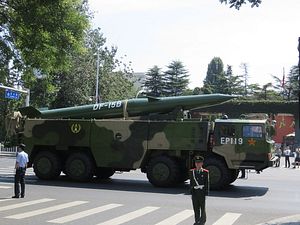Yao was quite direct: “China’s No First Use policy will not change, not only in the Taiwan scenario but in other scenarios as well, and we have 100 percent confidence that we can deal with the Taiwan independence issue by peaceful means and, if necessary, non-peaceful means.”
Unsurprising, but then Sha drew legs on the snake: “And, to add [to] what General Yao said, at any cost we will certainly do the job on our own. … I wish it would never happen, but it’s a wish. But we have to think of the worst scenario … [if] this scenario appeared and China were cornered, as I said earlier, we had no choice but to do the job at any cost.”
Had this been a discussion of a Taiwan scenario, Sha’s comment may have passed with little notice, simply an expression of national resolve. But in a discussion of nuclear policy, it led the audience to a very different and chilling conclusion, expressed in the next audience member’s comment: “It seemed like there was an implied threat to use nuclear weapons in a scenario with China.”
China’s public policy seems clear enough: it will not use nuclear weapons without first absorbing a nuclear attack. It claims that its arsenal is not constructed to target an opponent’s nuclear or command and control capabilities, but rather to deter a nuclear attack by punishing the enemy populace (countervalue targeting). There are undoubtedly details China keeps guarded, but that does not change its outward policy.
Whether intended by Sha or not, the audience’s inference reminds us that a country with nuclear weapons can decide to use them at any time, regardless of policy. Ironically, the very emergencies envisioned by a nuclear policy would be so traumatic as to call any previous policy into question. Thus the threat of nuclear attack always remains as a deterrent to preventing governmental collapse, regardless of policy.
There is however a human instinct to prevent annihilation, such that even under the threat of regime collapse leaders would think twice before launching a senseless strike. They would trust that our better angels would win out in the future, even if they themselves weren’t around to see it. For these leaders, nuclear weapons may be a deterrent only, not a usable weapon.
Sadly and frighteningly, in contrast, the ruthlessness of a regime like North Korea’s makes it less likely to acknowledge others’ humanity. Its paranoia and readiness to employ any means in its own survival should make all other nations wary of the possibility of a nuclear attack out of spite, even in response to a purely internal threat.
China by all accounts, however, is well beyond the stage of needing such desperate measures to stave off collapse. Quite apart from the debate over whether a leader would actually use nuclear weapons, it is possible that a nation seeking to become a “great nation” might very well have an impulse to upgrade its nuclear arsenal and policy commensurate with its new status. Thus Sha’s apparent equivocation may not have been a snake’s legs, but rather a glimpse at a hidden dragon.

































